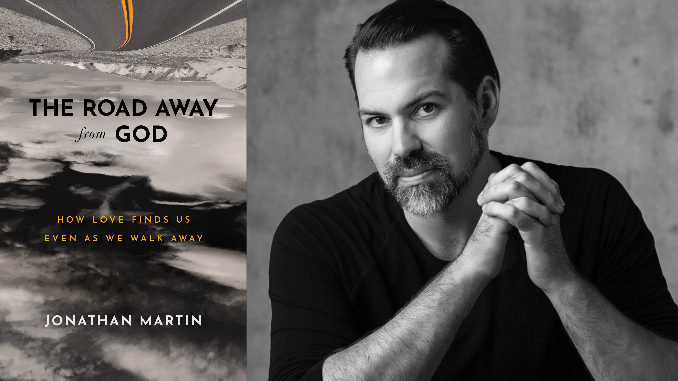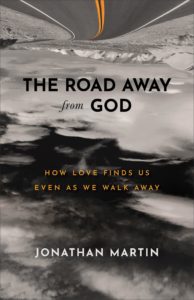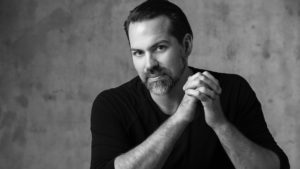
Podcast (beyond-the-page): Play in new window | Download
Subscribe: Apple Podcasts | RSS
When the COVID-19 pandemic began, it accelerated something that I had been seeing in churches. People were leaving and they weren’t coming back. When COVID forced people out of the normal routine, they were able to step back from church and found that…well…they found that it started them on a walk away from God. Or the church. Deconstruction, some call it. These people still loved Jesus but found their churches promoting policies and politics that didn’t seem very Christlike. So what now? In The Road Away From God, Jonathan Martin uses the Emmaus story in the Gospels to talk about how God remains with us even as we walk away. Join Josh Olds and Jonathan Martin as they talk about this journey.
The Conversation | Jonathan Martin
This excerpt has been edited for clarity and content. Listen to the full interview in the player above or wherever you get your podcasts.
Josh Olds: So let’s get back to the book, The Road Away from God. Give the listener some idea of what this book is about? Who were you writing it to?
Jonathan Martin: This book feels like a love letter to my friends. I feel like almost everybody that I care about has had some sort of really significant shift in their religious and their spiritual experience last few years. And for most people that feels violent, and scary, and alienating. Especially since they’ve had some kind of a shift in terms of their faith community and our community is so often are connected to our identity. Our communities tell us who we are, we know who we are, because of how we exist in relation to them. So I think when we shift in terms of our identity within a community, it makes sense that then all of a sudden, it can feel like everything shifted. Has my relationship with God shifted? How we relate to human communities or authority can be how we relate to God. So really, I hoped it would be a book that would bring some comfort and perspective for people who are very much in the in the thick of that. And again, my sense is a lot of people are in the thick of it in some way or another.
Josh Olds: What do you feel like has been the impetus for the change? You know, what made churches and certain church denominations and faith strains sort of make that slide toward maybe being more overt about the types of people that they didn’t want to include? Or the opposite of that is what made people begin to say, “I can’t do this anymore. I have to step away?”
Jonathan Martin: This is such a great question. I’m loving this conversation so much already, because I can’t even think of when someone’s asked me a version of that. So I think the thing is that certain kinds of figures in America in political power, and then a lot of church leaders actually held in common, was not so much a shared ideology, but more a shared pragmaticism. That it’s kind of like whatever it takes to win, whatever rises to the top. So I think like a certain kind of politics started working. And the folks who engineered those kinds of politics, were saying to people of faith, “Hey, we’ve got room for you here.” “We’d love to have you pray at our prayer breakfast.” “We’d love to have your church participate in this thing” or whatever. And so suddenly, they have more proximity to power than they had before. They’re at the place of power. And so I think a lot of it wasn’t even so much, like directly ideological. It is more like, “Oh, hey, well, now we have this opportunity.” Now we have someone who, at least in terms of lip service, says that that we matter, and that we can have more of a kind of a formal seat at these at these tables of power. And I feel like that’s the thing that became kind of intoxicating, is that, well, if going more in this direction, gives us more access, gives us more influence in this way, then maybe that’s the maybe that’s what God is doing. When you have a theology that basically says, what God always wants is more influence, is for us to have more access to more people…Well, if these folks are able to help you do that hid then it becomes like, “Well, why not that? Obviously, that’s the will of God.” That’s my sense of it anyway,
The Book | The Road Away from God
 It’s no easy journey disentangling the good news of the gospel from the toxic theologies that have rendered Jesus unrecognizable. It’s no wonder the church has sent many walking.
It’s no easy journey disentangling the good news of the gospel from the toxic theologies that have rendered Jesus unrecognizable. It’s no wonder the church has sent many walking.
In The Road Away from God, Jonathan Martin reimagines Luke’s story of two disillusioned disciples walking the Emmaus road away from the holy city where they had watched their hope die a gruesome death right before their eyes.
For anyone who is feeling their faith unravel, reckoning with religious trauma, or walking the long road of deconstruction, Martin speaks compassionate hope into the journey of today’s disillusioned disciples, revealing that the resurrected Christ is profoundly present with them–even on what seems to be the road away from God.
With “a pastor’s heart and poet’s touch,” as Rachel Held Evans once wrote of Martin, this is a book to help you feel seen in your spiritual journey and all its complexities, and to find resurrection even where you least expect it.
The Author | Jonathan Martin
 Jonathan Martin is a writer, poet, and speaker who has undergone his own experience of finding God on the underside of life. Wherever he goes, his message is always the same: no matter who you are, where you’ve been, or what you’ve done, God is at work to bring beauty out of your brokenness. He has a ThM from Duke University and MA from The Pentecostal Theological Seminary. Currently he lives in Oklahoma City, Oklahoma, where he serves as pastor of The Table and host of The Zeitcast.
Jonathan Martin is a writer, poet, and speaker who has undergone his own experience of finding God on the underside of life. Wherever he goes, his message is always the same: no matter who you are, where you’ve been, or what you’ve done, God is at work to bring beauty out of your brokenness. He has a ThM from Duke University and MA from The Pentecostal Theological Seminary. Currently he lives in Oklahoma City, Oklahoma, where he serves as pastor of The Table and host of The Zeitcast.
